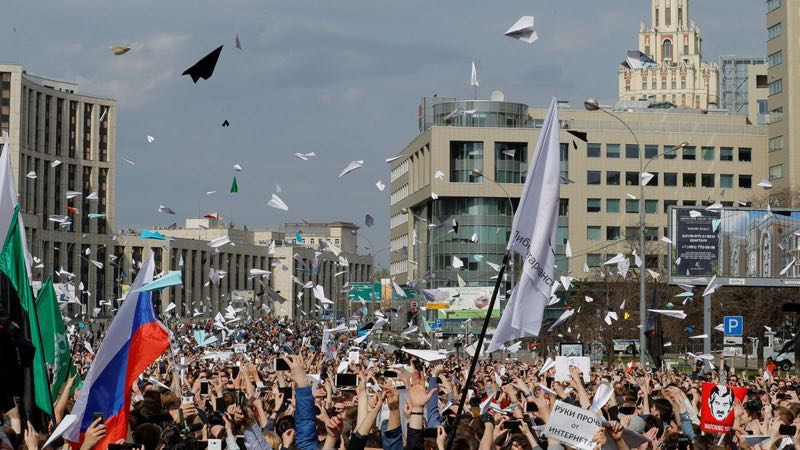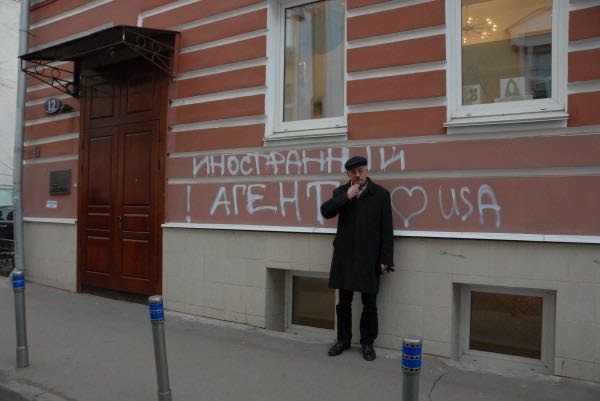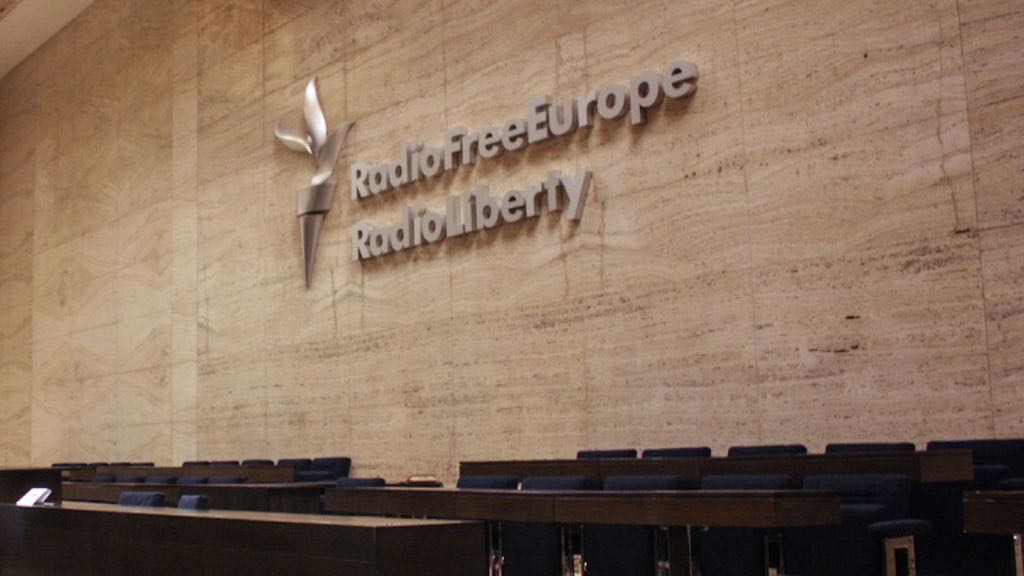YouTube, twitter, Facebook: international social media are an important source of information in Russia. But state watchdog Roskomnadzor is tightening the screws and the Duma adopts laws that will curb foreign internet providers. Russia strives for a 'sovereign internet' to eliminate foreign influence and control opposition. Expert Alena Epifanova from DGAP shows that step by step Russia strives to win back lost territory.
 Paper planes at Internet protests against ban on Telegram in March 2019 in Moscow
Paper planes at Internet protests against ban on Telegram in March 2019 in Moscow
by Alena Epifanova,
On March 10, 2021, Russia tested its 'sovereign internet' by slowing down Twitter. According to Russia’s federal censor Roskomnadzor [State Committee for Inspection of the Media], the global social media platform refused to remove posts relating to suicide, child pornography and drugs. In reality, the restrictions were prompted by widespread calls made via Twitter to join protests in support of Kremlin critic Alexei Navalny.
Upcoming parliamentary elections in Fall 2021 could well also be behind the increasing pressure on social media. However, the Russian government’s approach to internet and information technologies is far more strategic and applies externally as much as domestically.
New level of confrontation
It is difficult to assess to what extent Roskomnadzor, which is responsible for implementing the so-called 'sovereign internet law', was successful in its actions against Twitter, as the censor hasn’t explained how it is slowing down the social media platform. Furthermore, users in Russia experienced the throttling differently and partly continue to use Twitter. But what we know for sure is that the implementation of the 'sovereign internet law', which came into force on November 1, 2019, is very opaque: there is no official information about the 'technical equipment for counteracting threats' which was installed on the network of Russia’s internet service providers (ISP) as part of the law. We do not know either if it has already been installed country-wide and we are even less aware what risks the use of this equipment could pose to the internet infrastructure and the people in Russia.
What we know from Russia’s biggest ISPs is that they have already installed the required equipment – Deep Packet Inspection (DPI). This equipment enables the monitoring, filtering, and slowdown of internet traffic, user requests, as well as the blocking of specific content; by using this, Roskomnadzor can independently limit the speed of access to certain websites.
On the same day – March 10, 2021 – in parallel to the throttling of Twitter, Rostelecom – the largest ISP in Russia – confirmed technical problems with internet access, Russia’s government websites went down, as did several other websites of major companies. Services including Qiwi, VTB, Alfa Bank, Yandex and Google worked only intermittently or became completely inaccessible.
There has been no plausible explanation from Roskomnadzor for this, but it insisted that this had nothing to do with the Twitter slowdown. However, this outage could be collateral damage from Roskomnadzor’s intervention in the data flow as the technology has not yet been fully tested. This could have far larger consequences for the stability and integrity of the internet in Russia.
This slowdown seems to be a technical challenge for the Russian authorities and partly recalls the failure to block the encrypted messaging app Telegram during 2018–2020. Back then, Pavel Durov, the founder of the messenger, worked hard to circumvent censorship. Telegram constantly and quickly switched to new servers and Roskomnadzor was not able to ban the IP addresses of all these servers. Additionally, the blocking caused outages, as Telegram uses servers which are also used by other services. In the end, Roskomnadzor had to give up and 'lifted demands to restrict access to Telegram'. It is unclear if Twitter will fight as hard as Telegram did. Also, the Roskomnadzor of today is better equipped, thanks to the 'sovereign internet law' and DPI systems it has new instruments to censor undesired content.
For now, there are still no signs how Roskomnadzor will change its policies toward Twitter particularly, and foreign social media in general. Instead, the recent slowdown demonstrated the next level of escalation of the conflict between the Russian authorities and foreign internet companies. Roskomnadzor has warned Twitter that it will block it in Russia completely if it does not comply with the censor’s demands to remove content which is seen as a threat.
It is very likely that Twitter will be blocked in Russia as far as Roskomnadzor can technically do it...
It is very likely that Twitter will be blocked in Russia as far as Roskomnadzor can technically do it. It is less popular in the country than other social media and its blocking will not lead to a major public discontent. And it is expectable that there will be more obstacles and pressure on other foreign platform such as Facebook and YouTube, but it will be much more difficult to block them. Especially YouTube is a hard target: it is the most popular social media platform in Russia and its blocking would mean a serious conflict with a large part of the citizens and also with the tech giant Google which owns the video hosting service.
Plenty of other Google services and operating systems such as Gmail, Google Drive, Android have been integrated in the economy and everyday life of the people in Russia. Despite the presence of solid equivalents to America’s services provided by Russian firms such as Yandex and Mail.ru Group, there are still not enough domestic solutions that could quickly replace the widely used foreign services and technologies at the same quality level.
 Anti-stalinist ngo Memorial was one of the first to be labelled as a 'foreign agent' (picture Memorial)
Anti-stalinist ngo Memorial was one of the first to be labelled as a 'foreign agent' (picture Memorial)
The reason for the growing pressure on foreign internet companies is the long-standing approach of the Russian government to information security, and its importance in sustaining the current regime. Dissemination of 'information prohibited by law' is classified as a threat to the security of the internet in Russia and therefore such information and its source can be blocked. This gives the state authorities much room for maneuver in censoring undesired information and with the DPI system they have the technical means for centralized filtering and blocking of websites. As long as the state sees information as a threat and as long as there are foreign companies operating in Russia, it will see itself as vulnerable and will apply even more pressure.
...YouTube is a hard target: it is the most popular social media platform in Russia
Foreign agents 'threaten' Russia’s sovereignty
In this race for information and internet control, Russia’s domestic and foreign politics overlap and have become a strategic priority in maintaining state 'sovereignty'. Russia’s leadership tries to prevent any kind of foreign intervention in domestic affairs: from fining the Russian-language service of US-funded Radio Liberty/Radio Free Europe to expelling European diplomats for attending a protest in support of Alexei Navalny.
'Of course, they will try to interfere [in our elections, AE], they always do, and not only in our elections, but almost all over the world. […] We know about it and are getting ready for it. […] Therefore, the sentiments of internet bloggers, the sentiments of the media and their intention to protect themselves is a crucial thing, the protection of our sovereignty', said Russian President Vladimir Putin during his annual press conference on December 17, 2020.
As Russia’s leadership sees it, it is not only elections that are targeted by foreign countries, but also public demonstrations, civic education and online media. Therefore, Russian lawmakers have been actively adopting the legislation, expanding the concept of so-called 'foreign agents' from NGOs to individual people. Given the recent legislative changes allowing individuals to be accused of being 'foreign agents', anyone involved in political activity and receiving money directly or indirectly from abroad, or otherwise engaged internationally, could be targeted and linked to alleged 'foreign intervention'.
Against this background, foreign social media companies pose similar threats to Russian sovereignty, as the state does not have the same control levers for them as it does for domestic ones. Therefore, various laws and tools against foreign media platforms have been introduced. These give the authorities the power to block them, not only if they do not remove 'illegal' content, but also if they 'discriminate' against Russian media. Shortly after Facebook, Twitter and YouTube started to label state-affiliated Russian media accounts, Russia adopted legislation allowing Roskomnadzor to fully or partially block or fine the platforms 'censoring' Russian media.
To create additional impediments to foreign internet companies, other measures have been put in place in order to favor Russian social media and services. For example, the Accessible Internet project provides access free of charge, i.e. without paying for the internet traffic, to 371 'socially significant' websites approved by the government, including social media platforms VKontakte, Odnoklassniki [Classmates] and Moy mir @Mail.ru.
 Navalny (here in penal colony) with his YouTube films constantly attacks the Russian government (picture Instagram)
Navalny (here in penal colony) with his YouTube films constantly attacks the Russian government (picture Instagram)
From April 1, 2021 on, all smartphones sold in Russia will need to preinstall Russian applications
Moreover, from April 1, 2021 on, all smartphones sold in Russia will need to preinstall Russian applications – among others, search engine, maps, email service, payment system – from a government-approved list including the same social media. The strategy behind this approach is clear: Russian users should primarily use Russian internet services, which are easier to surveil and manage. Since international companies such as Google, Facebook and so on cannot be banned immediately, they will simply be so severely disadvantaged that users will leave them and instead move – apparently voluntarily – to a network in which the state can exercise greater social control.
Russia’s greater ambitions
There is also another reason for the race for information and internet state control, where Russia’s domestic and foreign politics tightly interconnect. The Russian leadership perfectly recognizes that the internet is not just about politics, but it also provides infrastructure for state, business, security, and defense. Both the 2000 and the 2016 versions of Russia’s Doctrine of Information Security assessed Russia's dependence on foreign-origin IT and therefore identified a serious vulnerability in the state’s sovereignty. At the same time, in the ongoing competition over technologies between the United States and China, new spheres of influence are crystalizing, and therefore Russia’s great power ambitions need to be adapted to the new challenges.
 The office of Radio Free Europe/ Radio Liberty is threatened with huge fines in Russia (picture Wikicommons)
The office of Radio Free Europe/ Radio Liberty is threatened with huge fines in Russia (picture Wikicommons)
Indeed, Russia’s leadership sees information technologies as the determining basis for the country’s future and the technological race as a crucial element in the ongoing great power competition. Putin was clear in his Address to the Federal Assembly 2018: 'The speed of technological progress is accelerating sharply. […] Those who manage to ride this technological wave will surge far ahead. Those who fail to do this will be submerged and drown in this wave. Technological lag and dependence translate into reduced security and economic opportunities of the country and, ultimately, the loss of its sovereignty.' In his last Address, he stressed the need for technological sovereignty: 'We must create our own technologies and standards in areas that define our future, such as, first of all, artificial intelligence, genetics, new materials, energy sources and digital technology.'
Putin: 'Technological lag and dependence translate into reduced security and loss of sovereignty'
This understanding was key in the decision to pass internet and tech legislation with a bigger role for the national state and a reduced presence for foreign IT companies in the country. Over the past few years, Moscow has introduced a robust legal framework and a plethora of regulations meant to assert Russia’s future digital sovereignty. For, with such strategic goals defining the future of the country, there is no space for foreign companies.
Likewise, there are regulations and plans aiming to pose obstacles to foreign companies and in parallel maintain home-grown alternatives. These include a law legislating import substitution for IT products used by government agencies, state-owned corporations and critical infrastructure, a government plan to use only Russian-made systems and software in building the country’s fifth-generation cellular network, 5G, and development of artificial intelligence (AI) relying on domestic solutions and defending its 'technological sovereignty'.
For now, it is still not clear how successful Russia will be in achieving these ambitious goals. It will take time to gain more digital sovereignty, as Russia’s web is fully integrated into the global internet and the country depends on foreign information and communications technologies which can't be quickly replaced. Also, a long-standing lack of investment in Russia’s tech sector, securitization of the internet and political pressure on private companies present additional serious obstacles to Russia’s leading place in the great power tech competition.
However, given the importance of the internet and technologies for protecting the domestic status quo and the regime’s resilience, Russia’s leadership will keep trying to expand state control over the internet and its citizens as much as possible and create digital sovereignty. At the same time, with the growing role of technologies for international relations in mind, it is very likely that Russia will pursue its goals in this technological race. Even if it is doubtful that Russia can become an innovator and trend-setter in this field, it will try to adapt and find its place in the new digital realm.
Alena Epifanova is a researcher at the German Council on Foreign Relations (DGAP) in Berlin
